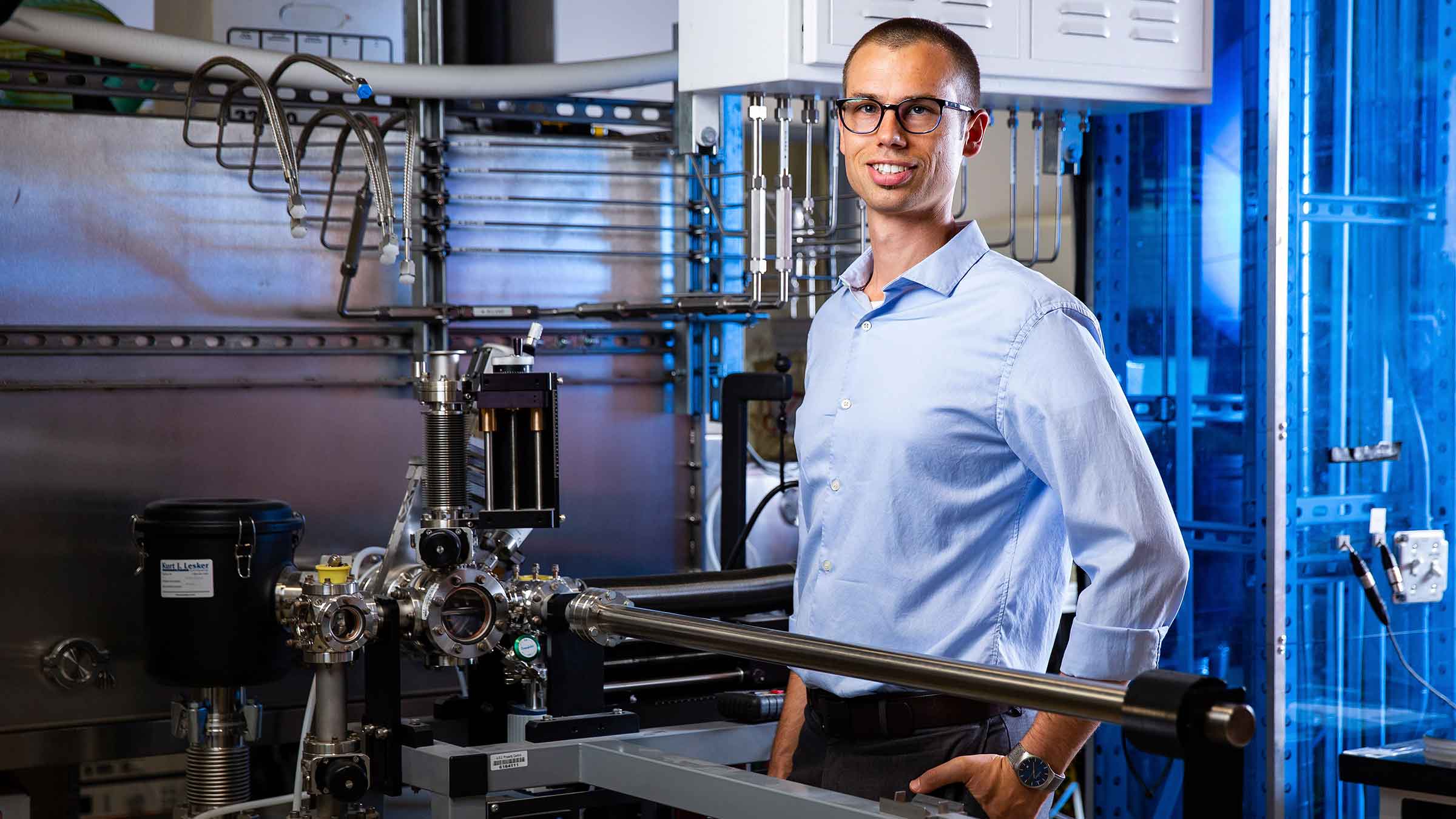
Zachary Holman named vice dean for research and innovation

Zachary Holman has had an impactful career during his time as a faculty member in the Ira A. Fulton Schools of Engineering at Arizona State University.
The professor of electrical engineering, who specializes in materials science and engineering for solar technology, has been involved in various research efforts at the university, including helping broker agreements with industry and academic collaborators to expand ASU’s research impact and co-founding three startup companies in the materials science and photovoltaics fields.
One of his most recent achievements includes his startup company, Swift Coat, receiving a grant from NASA to adapt a coating technology for space helmets that reduces fogging caused by astronauts’ breath. Holman and the company’s co-founder, a former doctoral student who studied under him, invented the coating, which causes water to spread out evenly — and invisibly — instead of forming into droplets that block vision.
Holman’s accomplishments earned him the title of vice dean for research and innovation, or VDRI, in the Fulton Schools in fall 2023. He plans to use the platform to maximize the impact of the Fulton Schools’ far-reaching research, while emphasizing the need for industry collaboration.
“Partnerships are critical to the success and growth of the Fulton Schools,” Holman says. “We want to solve problems that matter.”
Kyle Squires, dean of the Fulton Schools and ASU vice provost of engineering, computing and technology, says Holman’s appointment to the new role is well-deserved and that the Fulton Schools has a bright research future ahead.
“Throughout his time in the Fulton Schools, Zak has consistently demonstrated an ability to define and execute solutions to research questions that add to foundational understanding while advancing real-world engineered systems, in turn embodying use-inspired research,” Squires says. “Zak’s entrepreneurial acumen has helped him build inclusive strategies for engaging stakeholders in ways that ensure solutions developed lead to the greatest societal impact. As the vice dean for research and innovation, we look forward to supporting Zak to grow our research portfolio in ways that align with university goals.”
A new name and strategy for Fulton Schools innovation
Though Holman has co-founded three companies, he says this is his first time coming into a leadership position with an established team in place. Holman’s first goal: observe team dynamics to ensure processes and people already collaborating effectively continue to do so in a cohesive fashion.
Holman’s first few months in the role helped him identify what could be improved to help research in the Fulton Schools flow more smoothly.
“I find that if you ask faculty what holds them back from growing their research, I don’t hear the answer, ‘There aren’t enough grant opportunities that are a good fit for me to apply for,’” Holman says. “It’s always things like, ‘I am not getting the equipment that I need installed in a timely fashion.’”
He aims to improve logistics efficiency wherever possible to help faculty continue developing their innovative technologies and processes.
To better define the objectives for a new direction for Fulton Schools research, Holman came up with a new name for the office: the Office of Research, Innovation and Entrepreneurship, or ORIEN.
“Historically, the office didn’t necessarily have a name,” he says. “Most people were referring to it as the VDRI office, but I wanted a name that was inclusive of the full team, especially as we grow it.”
Beyond the name change, Holman has hired Visar Berisha, a Fulton Schools professor of electrical engineering who has a joint appointment in ASU’s College of Health Solutions, as the associate dean for research commercialization — a role that focuses on translating research from the university setting to the marketplace. Additionally, he has named research directors to represent various schools in the Fulton Schools. The research directors provide insight from their respective schools regarding their research environments, areas of expertise and priorities.
The first group of Fulton Schools research directors includes:
- Umberto Celano, an associate professor of electrical engineering, representing the School of Electrical, Computer and Energy Engineering.
- Anca Delgado, an assistant professor of environmental engineering, representing the School of Sustainable Engineering and the Built Environment.
- Paulo Shakarian, an associate professor of computer science and engineering, representing the School of Computing and Augmented Intelligence.
- Sarah Stabenfeldt, a professor of biomedical engineering, representing the School of Biological and Health Systems Engineering.
- Seth Ariel Tongay, a professor of materials science and engineering, representing the School for Engineering of Matter, Transport and Energy.
- Wenlong Zhang, an associate professor of engineering, representing the School of Manufacturing Systems and Networks.
These newly appointed leaders are focused on ensuring Fulton Schools research endeavors achieve maximal societal impact.
Along with the new positions, Holman laid out four research impact themes to guide engineering research for the next five years in the directions where it matters most: Technology-Enhanced Health and Medicine, Competitive Manufacturing in an Advanced Economy, Climate Technology Solutions and National and Economic Security.
Each research impact theme includes focus areas called Engineered Embodiments that describe specific examples of technology and processes within the broader topic area.
The theme of Technology-Enhanced Health and Medicine aims to improve capabilities for health care and medicine through innovations in medical imaging, cell and tissue engineering and biosensors.
Through the Competitive Manufacturing in an Advanced Economy theme, Holman sees Fulton Schools researchers pushing the boundaries of fields like data gathering and analysis, additive manufacturing and automation. Due to the revival of manufacturing in the U.S., the impact theme reflects the goal to gain an edge for production of the nation’s goods in a global economy.
With the world facing increasingly dire risks if climate change proceeds unchecked, the research impact theme of Climate Technology Solutions seeks to develop and deploy technologies that enhance sustainability for water infrastructure, the power grid and solar-generated electricity and its storage.
The fourth impact theme of National and Economic Security aims to boost U.S. resilience against threats to the nation’s health and safety militarily and economically through communications technology, microelectronics and the rapidly evolving field of artificial intelligence.
Becoming the best for engineering research
Holman has ambitious goals for Fulton Schools research.
“I want the Fulton Schools to be the best engineering college in the U.S., if not the world, to conduct engineering research and achieve impact,” he says. “I believe that value creation at a university begins with the faculty. ORIEN’s mission is both to remove barriers that prevent Fulton Schools faculty from creating more research value and to provide infrastructure, processes and opportunities that help faculty and students capture the research value they create.”
Holman aims for the Fulton Schools to produce ambitious graduates who, along with faculty members, write award-winning research papers, start successful companies and patent innovative inventions.
Sally C. Morton, executive vice president of ASU’s Knowledge Enterprise, looks forward to working with Holman to achieve a maximal impact through new ideas from the university’s students and faculty.
“Dr. Zachary Holman’s promotion to vice dean of research and innovation for the Fulton Schools underscores his significant contributions to ASU and our communities,” Morton says. “Dr. Holman’s many achievements have won exceptional recognition, and I am looking forward to seeing the impact his innovative vision and collaborative approach will have on changing the way the world solves problems.”



































